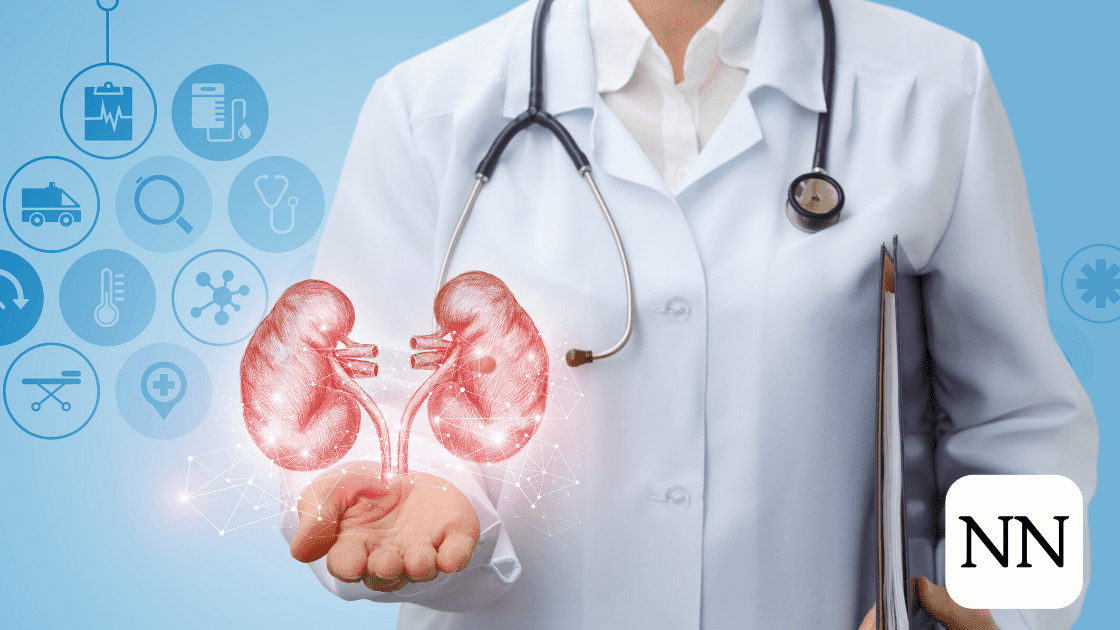
CKD and LCHF by Dr Neville Wellington
The most common cause of kidney disease is diabetes (38.3% prevalence found), although there is a continuum of disease seen in those who are overweight (without diabetes) going on to those who have frank diabetes. (1, 2) Chronic kidney disease (CKD) is diagnosed using a measure of the glomerular filtration rate (GFR) which is estimated based on creatinine levels and then called estimated glomerular filtration rate (eGFR). (See table 1). In addition protein leakage (or albuminuria) from damaged glomeruli is also used to measure kidney damage and can be added as evidence of damage. (see Table 2)(3) In general, if eGFR is low and albuminuria (which can range from micralbuminuria to macroalbumniria) is present it signifies worse damage and worse long term outcomes. Even in early stages of renal damage, there is an increase in cardiovascular diseases, higher rates of amputations, higher rates of eye disease (retinopathy) and sudden death, so it is important to follow these patients carefully.
| Table 1. Chronic Kidney Disease (CKD) Stages classified by Glomerular Filtration Rate (GFR) | ||
| CKD Stage | GFR (mL/min/1.73m²) | Qualitative Category |
| Stage 1 | ≥90 | Normal |
| Stage 2 | 60-89 | Mild decrease |
| Stage 3a | 45-59 | Mild to moderate decrease |
| Stage 3b | 30-44 | Moderate to severe decrease |
| Stage 4 | 15-29 | Severe decrease |
| Stage 5 | <15 | Kidney failure/ESRD |
ESRD = End stage renal disease
|
Table 2: Definitions of the various Urinary Albumin Excretion calculations on a spot urine |
|||
| mg/g creatinine | mg/mmol creatinine | ||
| Normal | <30 | <3.5 (female) | |
| <2.5 (male) | |||
| Microalbuminuria | 30-299 | 3.5-30 (female) | |
| 2.5-30 (male) | |||
| Macroalbuminuria | ≥300 | >30 | |
Pathophysiology of CKD
In general there are 3 factors known to play a role in CKD viz. genetic factors, haemodynamic changes and hyperglycaemia.(4) As far as genetic factors are concerned, it has been shown that when parents have diabetic nephropathy (DN) (or CKD primarily caused by diabetes) then the children with diabetes have a significantly increased chance of having DN. Haemodynamic changes refer to the early changes that take place in CKD, such as hyperfiltration which later leads on to damage to the glomeruli. (5) However, by far the most important cause of damage to the kidneys is by hyperglycaemia. (6, 7) In simple terms high levels of glucose entering the glomeruli filtration system causes damage to the cells and the mesangium (the tissue that holds all the capillaries in the glomeruli together) through multiple pathways. These include damage to proteins (which are then called advanced glycation end products (or AGES)), the development of reactive oxygen species (ROS) in the mitochondria, which can then damage the DNA of cells and subsequently cause death of cells. (8) Many more pathways have been described,(9) but the ultimate outcome is ongoing and worsening scarring of the filtration mechanism which, if left unchecked, leads to renal failure. The question we then want to know is if we reduce glucose levels specifically using low-carbohydrate diets, can we improve or at least reduce the progression of CKD?
Are low carbohydrate diets safe in CKD?
Studies that have tried lifestyle interventions have for a long time focused on the effects of reducing protein in the diet, changing the metabolic acidosis by adding alkali and/or increasing fruit and vegetables, or reducing salt and phosphate levels. (10) These interventions did show promising results and seemed to slow the progression. Unfortunately, reducing levels of protein too low (<60g/kg/day) was also accompanied by worse outcomes, with increased incidence of malnutrition and death. Recommendations have therefore included protein intakes at slightly higher levels of around 80g/kg/day. Even at these levels protein restricted diets can be difficult to follow. (1)
So logic dictates that if foods that release glucose viz carbohydrates, cause glucose levels to rise, and unfortunately, in diabetes patients, to rise abnormally and cause damage, then reducing the intake of these foods should allow the damage to reduce. In fact, intensive glucose management has been shown to reduce progression of CKD in both the Diabetes Control and Complications Trial (DCCT) and the U.K. Prospective Diabetes Study (UKPDS). (3) These were trials using diabetes medications with some lifestyle interventions, not necessarily Low-carbohydrate diets, but did show that reducing glucose levels, as shown in the HbA1c levels, did have a positive effect. Furthermore, in multiple studies of low carbohydrate diets, almost all have shown marked improvements in HbA1c levels. (11-15)
What is interesting, is that when studies on Low-carbohydrate diets have been analysed, the actual protein content was around 0.6-1.4g/kg/day, so a well-managed low carbohydrate diet could keep protein levels low enough for safety.(1)
In looking for studies that answer this question, I was unable to find studies that definitively proved that low carbohydrate diets were safe in CKD, specifically in patients who were below stage 3. Yet none proved they were unsafe either.(1) In an interesting case report of 2006 Nielsen et al reported on a patient with type 2 diabetes, whose Renal function and albuminuria were worsening as his diabetes worsened, he was put on insulin and gained weight. However, changing to a low carbohydrate diet saw a reversal in weight, removal of insulin and a stabilization of the renal function, with a reduction in albuminuria. (16) Following on this 2 meta-analyses and 1 review of Low carbohydrate diets and renal function failed to show any detrimental effects on renal function in patients who were using low carbohydrate diets vs higher carbohydrate diets. (17, 18). Unfortunately, only patients with relatively normal renal functions were evaluated in the studies and the improvements in glycemia levels were not evaluated against potential harm or benefit of the kidneys. In a 2 year follow up of an intensive low carbohydrate lifestyle, it was found that as patients with diabetes improved their Hba1c levels (>50% were below 6.5%), had not only no worsening of the renal function, but actually had an improvement as measured by a slight increase in eGFR levels. (19)
So what can we can take home from this?
- Low carbohydrate diets in diabetes patients are safe is those who still have normal renal function or stage 2 CKD. Certainly this is true of studies up to 2 years.
- Low carbohydrate diets may even help improve renal function, and certainly prevent further damage.
- No actual clinical trials have been done in patients in, specifically, patients with stage 3 or worse CKD, to confirm whether low carbohydrate diets are beneficial or detrimental.
- Anecdotal evidence, and I also have a few personal cases I have been following, seems to show that low carbohydrate diets and therefore good control of glycaemia, does have benefit is slowing down or preventing further damage in CKD in stage 3 or worse.
- It is very important that patients with CKD are followed up regularly and will also need help from a dietician well versed in planning careful meals for these patients so they don’t exceed the recommended protein load.
Conclusion
High glucose levels, as reflected in high HbA1c levels are damaging to kidneys. Low carbohydrate diets, which allow for good control of glucose levels, play a protective role in firstly preventing damage to the kidneys and may also reduce further damage in patients who already show signs of CKD. Patients with CKD must be followed up carefully to ensure they are eating correctly and that their renal function is monitored.
Kind Regards
Dr N Wellington
References
- Mitchell NS, Scialla JJ, Yancy WS, Jr. Are low-carbohydrate diets safe in diabetic and nondiabetic chronic kidney disease? Annals of the New York Academy of Sciences. 2020;1461(1):25-36. Epub 2019/01/16.
- Wu B, Bell K, Stanford A, Kern DM, Tunceli O, Vupputuri S, et al. Understanding CKD among patients with T2DM: prevalence, temporal trends, and treatment patterns-NHANES 2007-2012. BMJ open diabetes research & care. 2016;4(1):e000154. Epub 2016/04/26.
- Gross JL, de Azevedo MJ, Silveiro SP, Canani LH, Caramori ML, Zelmanovitz T. Diabetic nephropathy: diagnosis, prevention, and treatment. Diabetes Care. 2005;28(1):164-76.
- Fioretto P, Caramori ML, Mauer M. The kidney in diabetes: dynamic pathways of injury and repair. The Camillo Golgi Lecture 2007. Diabetologia. 2008;51(8):1347-55.
- Magee GM, Bilous RW, Cardwell CR, Hunter SJ, Kee F, Fogarty DG. Is hyperfiltration associated with the future risk of developing diabetic nephropathy? A meta-analysis. Diabetologia. 2009;52(4):691-7.
- Dronavalli S, Duka I, Bakris GL. The pathogenesis of diabetic nephropathy. Nature clinical practice Endocrinology & metabolism. 2008;4(8):444-52.
- Brownlee M. The pathobiology of diabetic complications: a unifying mechanism. Diabetes. 2005;54(6):1615-25.
- Rabbani N, Thornalley PJ. Advanced glycation end products in the pathogenesis of chronic kidney disease. Kidney international. 2018;93(4):803-13. Epub 2018/02/27.
- Giacco P, Brownlee M. Pathogenesis of Microvascular Complications. In: Holt RI, Cockram C, Flyvbjerg A, Goldstein B, editors. Textbook of Diabetes, 4th Edition: Blackwell Publishing; 2010. p. 555-74.
- Mitch WE, Remuzzi G. Diets for patients with chronic kidney disease, should we reconsider? BMC nephrology. 2016;17(1):80. Epub 2016/07/13.
- Accurso A, Bernstein RK, Dahlqvist A, Draznin B, Feinman RD, Fine EJ, et al. Dietary carbohydrate restriction in type 2 diabetes mellitus and metabolic syndrome: time for a critical appraisal. Nutrition & metabolism. 2008;5:9. Epub 2008/04/10.
- Westman EC, Yancy WS, Jr., Mavropoulos JC, Marquart M, McDuffie JR. The effect of a low-carbohydrate, ketogenic diet versus a low-glycemic index diet on glycemic control in type 2 diabetes mellitus. Nutrition & metabolism. 2008;5:36. Epub 2008/12/23.
- Gannon MC, Hoover H, Nuttall FQ. Further decrease in glycated hemoglobin following ingestion of a LoBAG30 diet for 10 weeks compared to 5 weeks in people with untreated type 2 diabetes. Nutrition & metabolism. 2010;7:64. Epub 2010/07/31.
- Gannon MC, Nuttall FQ. Control of blood glucose in type 2 diabetes without weight loss by modification of diet composition. Nutrition & metabolism. 2006;3:16. Epub 2006/03/25.
- Nuttall FQ, Schweim K, Hoover H, Gannon MC. Effect of the LoBAG30 diet on blood glucose control in people with type 2 diabetes. The British journal of nutrition. 2008;99(3):511-9. Epub 2007/09/18.
- Nielsen JV, Westerlund P, Bygren P. A low-carbohydrate diet may prevent end-stage renal failure in type 2 diabetes. A case report. Nutrition & metabolism. 2006;3:23. Epub 2006/06/16.
- Suyoto PST. Effect of low-carbohydrate diet on markers of renal function in patients with type 2 diabetes: A meta-analysis. Diabetes/metabolism research and reviews. 2018;34(7):e3032. Epub 2018/06/16.
- Oyabu C, Hashimoto Y, Fukuda T, Tanaka M, Asano M, Yamazaki M, et al. Impact of low-carbohydrate diet on renal function: a meta-analysis of over 1000 individuals from nine randomised controlled trials. The British journal of nutrition. 2016;116(4):632-8. Epub 2016/06/28.
- Athinarayanan SJ, Adams RN, Hallberg SJ, McKenzie AL, Bhanpuri NH, Campbell WW, et al. Long-Term Effects of a Novel Continuous Remote Care Intervention Including Nutritional Ketosis for the Management of Type 2 Diabetes: A 2-Year Non-randomized Clinical Trial. Frontiers in endocrinology. 2019;10:348. Epub 2019/06/25.
